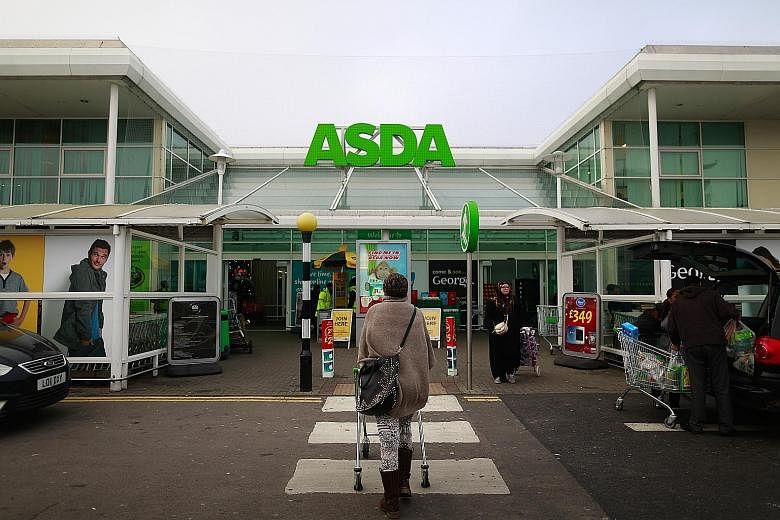LONDON • Sainsbury's has agreed to buy Walmart's Asda for about £7.3 billion (S$13.3 billion) to create Britain's biggest supermarket group by market share, overtaking longstanding industry leader Tesco.
Bringing together Britain's second-and third-largest supermarket groups could generate the savings and buying power to help them better compete with fast-growing German discounters and growth at Tesco after its purchase of wholesaler Booker.
The cash and shares deal could also provide a potential exit route for Walmart, as Asda, which it bought in 1999 for £6.7 billion, has been struggling to grow over the last five years, with discounters Aldi and Lidl attracting its price-conscious customers.
Sainsbury's shares jumped as much as 21 per cent to 327.1 pence in early trading yesterday, their highest since July 2014, while shares in rivals Tesco and No. 4 Morrisons fell.
Walmart will receive £3 billion in cash and a 42 per cent stake in the combined business' equity, valuing Asda at about £7.3 billion.
Sainsbury's chief executive Mike Coupe will retain that position in the merged company, which will keep the Sainsbury's and Asda brands.
Analysts said the deal was a bet that recent changes in the retail industry - including the rise in online shopping, hard discounters and Tesco's purchase of Booker - would ease any opposition from competition regulators.
Bernstein senior analyst Bruno Monteyne said if regulators included discounters - which sell a much smaller range of products - in their assessment of major competitors for the new group, it might have to sell only about 8 per cent of stores. But if they do not include discounters, disposals might have to reach 15 per cent of stores, which could undermine the deal.
Speaking to the BBC, Mr Coupe said divestments were possible, but there were no plans to close shops and customers would be unaffected.
"Even if we have to divest stores, they will be sold as trading entities," he told BBC Radio.
Together, Sainsbury's and Asda have 2,800 stores.
The deal comes as Britain's big four grocers continue to lose share to Aldi and Lidl and are also having to deal with growing demand for Internet grocery shopping and the relentless march of Amazon.
The two companies have different cultures and appeal to different customers, with London-based Sainsbury's strong in own-brand products, and Asda, headquartered in Leeds, northern England, focused on price.
Sainsbury's said the combination would generate synergies of at least £500 million and enable prices to be lowered by about 10 per cent on many products.
Qatar Investment Authority, the largest shareholder in Sainsbury's with a 22 per cent stake, said it supported the deal.
After a two-year lock-up period, Walmart is allowed to reduce its stake in the combined group to 29.9 per cent, and after four years could exit completely.
Sainsbury's reported its full-year results yesterday, showing a first rise in profit in four years.
REUTERS

